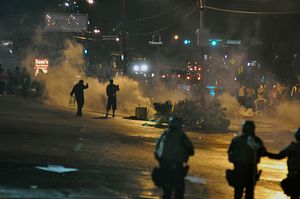The ongoing protests in Ferguson, Missouri, over the death of an unarmed black teenager at the hands of a police officer have drawn worldwide attention. This week the news finally drew a response from North Korea, which accused the U.S. of “wantonly violating … human rights” and of being a country where “people are subject to discrimination and humiliation due to their races.”
Pyongyang is not the first country to attempt to use Ferguson to turn the tables on America’s emphasis on human rights violations. Last week, China’s official media outlets rolled out a spate of commentaries using the Ferguson incident as an example of the “grim” human rights situations for minorities in the U.S. China urged America to clean up its own human rights situation rather than accusing others of human rights abuses.
North Korea, like China a frequent target of U.S. human rights lectures, used a similar theme in its own response. The statement, provided by the official Korean Central News Agency of the DPRK, began with an outraged description of the Ferguson incident. KCNA described the ensuing protests as “an eruption of the pent-up discontent and resistance of the people against [the] racial discrimination and inequality [that are] deeply rooted in the American society.” The statement even said that the U.S. should be forced “to sit in the dock of a human rights court” for its treatment of minorities.
North Korea’s main point, however, is to drive home that the U.S. is in no position to evaluate the human rights situation in other countries. As China often does, Pyongyang accused the U.S. of attempting to act as an “international human rights judge.” With the Ferguson incident, KCNA said, the U.S. emphasis on human rights has become the “laughing stock of the world.” The statement continued to tell the U.S. in no uncertain terms to “mind its own business, instead of interfering in the internal affairs of other countries.”
North Korea has been looking for a way to strike back at the U.S. (and the West in general) on the subject of human rights. Earlier this year, a scathing UN-commissioned report took the Kim regime to task for horrific and systemic human rights violations. The commission behind the report accused North Korea’s government of “unspeakable atrocities,” ranging from heavy restrictions on personal freedoms to outright torture. In a letter to North Korean leader Kim Jong-un, the commission said they would recommend the matter be referred to the International Criminal Court (although China will undoubtedly block the case from actually progressing).
Pyongyang roundly rejected the charges, saying the abuses noted in the report “do not exist in our country.” The government instead blamed the report on “a political plot aimed at sabotaging the socialist system,” with the U.S., European Union, and Japan explicitly accused of faking the material used to create the report.
Earlier this month, KCNA announced that North Korea will publish its own human rights report, to “show the true picture of the people of the DPRK dynamically advancing toward a brighter and rosy future while enjoying a free and happy life under the socialist system.” The report, KCNA added, will also “contribute to disclosing the dastardly moves of the U.S. and other hostile forces who are working with bloodshot eyes to bring down the ideology of the DPRK.”
The Ferguson protests are now being used to bolster Pyongyang’s assertion that the U.S. should not be able to pass judgment on North Korea’s human rights situation. In particular, the insistence that the U.S. should be tried for human rights violations echoes the charges leveled against North Korea itself some months ago.
































